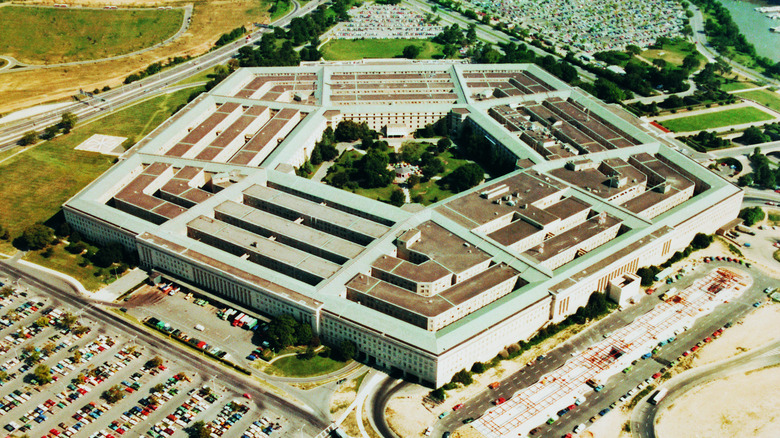Bernie Sanders Just Made His Stance Clear On DOGE
The Independent senator from Vermont has consistently been a headline maker through the last decade. From Bernie Sanders' seemingly improbable run as a contender for the Democratic Party nomination for the 2016 election to his meme-worthy appearances and biting commentary on all manner of topics, the politician knows how to make a splash. His most recent comments start off with a similar shock value, but ultimately take a hard pivot toward his usual policy posture.
Even with a surprise twist thrown into the mix, it's interesting to hear Sanders' take on the next administration's efforts to "cut the federal government down to size," according to an op-ed penned by Elon Musk and Vivek Ramaswamy in the Wall Street Journal. The Department of Government Efficiency (DOGE; seemingly named with the meme-inspired Dogecoin in mind) is shaping up to exist as an outside consulting operation that seeks to identify and eliminate wasteful spending throughout the government. Musk's edict that the effort can slash $2 trillion from the federal budget (about a third of its total spending) appears laughably inept given the fact that all the nation's federal employees combined (people like teachers, TSA staff, and military personnel) earn a collective salary that doesn't rise to that target. But there is one area that might help significantly reduce spending, and it looks like Sanders might be onto something.
Reducing bureaucracy is the department's mission
There's something raw and intrinsically positive about efforts to reduce wasteful spending within the government (as well as in your personal life). No one can claim that this goal isn't righteous, nor can they say it's not ambitions. But it's a wildly complicated task to shoulder, and no two people will see the job in the same way. Bureaucracy is the machine that keeps our nation running — and this is true for every other federal, state, and local coalition that has ever existed and will ever exist. The tiny responsibilities that bureaucrats manage (things like organizing trash collection, fixing potholes, or administering Social Security checks to retirees) would become a sea of unfulfilled needs if government services weren't in place to fill them.
Elon Musk and the DOGE organization see bureaucracy in a wholly different light, suggesting that "the entrenched and ever-growing bureaucracy represents an existential threat." Whether you agree with that vision or not isn't the point, and the reality is that bureaucracy is both necessary and it's cumbersome, problematic, and indeed wasteful at times. The very nature of organized government creates a unique void of individual accountability that can create opportunities for nepotism, wasteful spending, and poor decision making.
Bernie Sanders is onboard with DOGE, as long as it targets the Pentagon's budget, too
This brings us to Bernie Sanders. Certainly, the Vermont senator isn't in total agreement that the government should be minimized to the extent that Musk has envisioned. However, he does share the entrepreneur's vigor for hollowing out certain areas of the government. Specifically, Sanders is in favor of taking a microscope to the Pentagon's enormous budget. "Elon Musk is right," Sanders starts a post saying. "The Pentagon, with a budget of $886 billion, just failed its 7th audit in a row. It's lost track of billions. Last year, only 13 senators voted against the Military Industrial Complex and a defense budget full of waste and fraud. That must change."
In fact, the financial black hole goes even deeper. The Department of Defense has failed to achieve a "clean audit" since the CFO Act made the process mandatory in 1990 — that's 30-plus years of failing to account for the department's spending decisions. Moreover, DoD maintains a pool of assets worth roughly $3.8 trillion, second only to JPMorgan/Chase ($4.2 trillion) in total wealth among American entities. For its part, the Pentagon's chief financial officer has come out to say that the Pentagon hasn't uncovered any "significant fraud," and is "working toward a clean audit, which will likely be possible several years from now" (via New York Post). Pentagon budgets may not come under the gun given president-elect Donald Trump's longstanding position on expanding American military capabilities and scope. But a more complete audit process would likely be in the cards if these two mercurial personalities can come together on a plan to explore defense spending alongside other action items.


